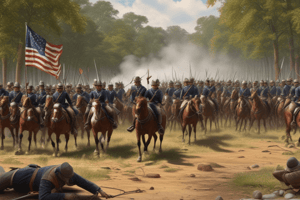Podcast
Questions and Answers
What was the location of the first battle of the Civil War?
What was the location of the first battle of the Civil War?
- Shiloh
- Richmond
- Gettysburg
- Bull Run (correct)
Who was the military hero of the Battle at Bull Run?
Who was the military hero of the Battle at Bull Run?
Stonewall Jackson
What was McClellan known for as the leader of the Union Army?
What was McClellan known for as the leader of the Union Army?
Being cautious
What was the goal of the Peninsula Campaign?
What was the goal of the Peninsula Campaign?
Who was the commander of the Confederate Army?
Who was the commander of the Confederate Army?
What was the Anaconda Plan?
What was the Anaconda Plan?
A blockade prevents ships from entering or leaving a port.
A blockade prevents ships from entering or leaving a port.
What was the purpose of the Emancipation Proclamation?
What was the purpose of the Emancipation Proclamation?
Match the following figures to their descriptions:
Match the following figures to their descriptions:
What was the outcome of Pickett's Charge during the battle at Gettysburg?
What was the outcome of Pickett's Charge during the battle at Gettysburg?
What was the significance of the Gettysburg Address?
What was the significance of the Gettysburg Address?
What was the strategic aim of Sherman's March to the Sea?
What was the strategic aim of Sherman's March to the Sea?
Copperheads were radical peace Democrats who supported compromise with the South.
Copperheads were radical peace Democrats who supported compromise with the South.
What happened at Appomattox Courthouse?
What happened at Appomattox Courthouse?
Who assassinated Abraham Lincoln?
Who assassinated Abraham Lincoln?
Flashcards are hidden until you start studying
Study Notes
Civil War Key Events and Figures
- Bull Run: Site of the first Civil War battle where both Union and Confederate forces anticipated a short conflict; post-battle, the South aimed for a "90-day war."
- Stonewall Jackson: Renowned Confederate military leader from the Battle of Bull Run, earned his nickname for effectively resisting Union advances.
- George McClellan: Union Army leader known for his cautious approach, beloved by his troops but criticized for inaction.
- Peninsula Campaign: The Union's strategic plan to capture Richmond aimed at quickly ending the war.
- Robert E. Lee: Confederate Army commander whose aggressive strategies often resulted in more casualties for his forces.
- "Jeb" Stuart: Confederate Cavalry leader noted for his reconnaissance missions that outmaneuvered Union troops.
Major Battles and Plans
- Seven Days' Battles: Series of conflicts led by Lee to repel the Union advance during the Peninsula Campaign, resulting in significant Union losses.
- Anaconda Plan: Union strategy to suffocate the Confederate economy through blockades and territorial division.
- Blockade: A naval strategy to prevent supplies from reaching the Confederacy, critical to the Anaconda Plan's success.
Military Innovations and Legislation
- Merrimac & Monitor: First ironclad ships that revolutionized naval warfare; Monitor represented Union advancements.
- Emancipation Proclamation: Issued by Lincoln, declared freedom for slaves in Confederate states, although it had limited immediate impact.
- Butternut Region: Area consisting of the old Northwest and Border States, often opposed to the Emancipation Proclamation.
Black Soldiers in the Civil War
- Frederick Douglass: Former slave who advocated for the enlistment of Black soldiers in the Union Army, leading to the creation of African American regiments.
- 54th Massachusetts: A distinguished all-Black regiment; faced heavy casualties during the assault on Fort Wagner.
- Fort Pillow: Site of a massacre of Black soldiers who surrendered, as the South did not recognize them as legitimate prisoners of war.
Union Command Changes
- Ambrose Burnside: Successor to McClellan, criticized for his leadership during disastrous battles.
- Joe Hooker: Took command after Burnside; known for leading forces during the battle where Stonewall Jackson was killed.
- George Meade: Assumed leadership just before Gettysburg; his accidental position contributed to the Union victory.
Key Turning Points
- Gettysburg: Significant battle regarded as a turning point in the Civil War; marked the decline of Confederate hopes for victory.
- Pickett's Charge: Final Confederate offensive during Gettysburg, characterized as a desperate effort that failed.
- Gettysburg Address: Lincoln’s brief but impactful speech delivered during the cemetery dedication after the battle.
Strategic Victories and Generals
- Ulysses S. Grant: Central Union figure recognized for his effectiveness as a commander; led significant campaigns throughout the war.
- Fort Henry & Fort Donelson: Locations of Grant's initial military successes that established his reputation.
- Vicksburg: Important stronghold on the Mississippi River that fell under Union control, crippling the Confederacy's supply lines.
Total War and its Effects
- William T. Sherman: Notorious for his "Total War" strategy, exemplified in his March to the Sea from Atlanta to Savannah, aimed at demoralizing the South.
- War Democrats vs. Peace Democrats: Divisions within the Democratic Party on how to address the war; the latter sometimes actively obstructed Union efforts.
Conclusion of the War
- Appomattox Courthouse: Final location of Lee's surrender to Grant, marking the end of the Civil War, with generous terms offered to Confederate soldiers.
- Ford's Theater: Site of Lincoln's assassination by John Wilkes Booth, occurring soon after Confederate surrender.
- Lost Cause: Post-war narrative by the South justifying the Confederacy’s actions and attitudes towards slavery, which lost its validity after the war concluded.
Studying That Suits You
Use AI to generate personalized quizzes and flashcards to suit your learning preferences.




